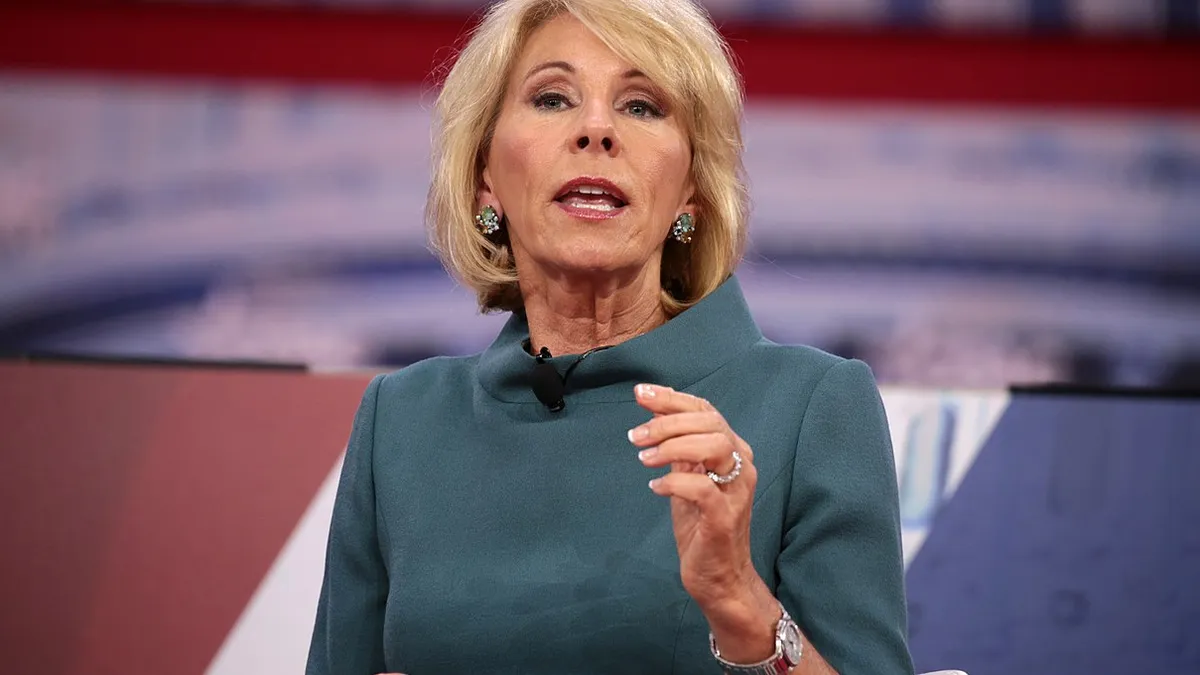Dive Brief:
-
Eighteen Democratic attorneys general are urging U.S. Secretary of Education Betsy DeVos and other federal officials to pause the release of federal regulations that would govern how colleges handle sexual violence cases.
-
The coronavirus has already burdened college administrators, they wrote in a letter last week to DeVos and three other officials. New rules on Title IX, the federal sex discrimination law, would spur more confusion about current sexual misconduct cases, they wrote.
-
Critics of the proposed regulations argue they would create unnecessary, courtroom-style Title IX proceedings and narrow the scope of cases colleges would need to investigate.
Dive Insight:
DeVos published her draft rules in 2018 after walking back Title IX guidance from the Obama administration the previous year. The Obama-era policies were largely credited with giving sexual assault survivors new protections, but they were derided in some circles for being unfairly slanted against accused students.
Her proposal proved unpopular among advocates of sexual assault survivors. They took particular issue with requirements that college officials hold a live hearing to make a decision in a case and that parties or their representatives be allowed to cross-examine each other.
The letter, signed by the top lawyers from 17 states and Washington, D.C., references the former provision. They wrote that certain legal obligations, including having a live hearing, would be "impossible and unsafe" during the current health crisis.
Most colleges have moved classes online in light of coronavirus and ordered students to vacate residence halls, so few of them remain on campus. College closures and social distancing measures have already complicated sexual violence complaints, they wrote, adding that during the pandemic, colleges need flexibility "to carry out Title IX’s mandate."
Administrators had anticipated that adapting to the new rules would be a heavy lift. Small institutions, for instance, may have never held a live hearing before and would need time to adjust to the rules' mandates. They also change the scope of what the law covers. For example, the rules newly reinforce the requirement that colleges must address campus domestic and dating violence under Title IX, according to The New York Times.
In ideal circumstances, changing institutions' Title IX policies to meet the regulations would take time and effort, the attorneys general wrote. In the current landscape, though, the burden on colleges would be "untenable."
Before the coronavirus upended operations at U.S. colleges, the rules' release was imminent. The White House’s Office of Management and Budget (OMB) has meetings scheduled to discuss them through mid-April. This is the last step before the Education Department unveils the final version of the rules.
No federal restriction exists to prevent OMB from abandoning the meetings and publishing the regulations, Jake Sapp, deputy Title IX coordinator and compliance officer at Austin College, told Education Dive. Several such meetings scheduled this month were "no shows," according to OMB’s online calendar.
The American Council on Education (ACE), representing more than 30 higher education groups, also wrote to DeVos last week, requesting she delay the Title IX rulemaking and another regulatory proposal until institutions resume normal operations. Schools currently don't have the capacity to carry out the rules, ACE wrote.
The Education Department declined Education Dive’s request for comment on Monday, citing on the ongoing rulemaking process










